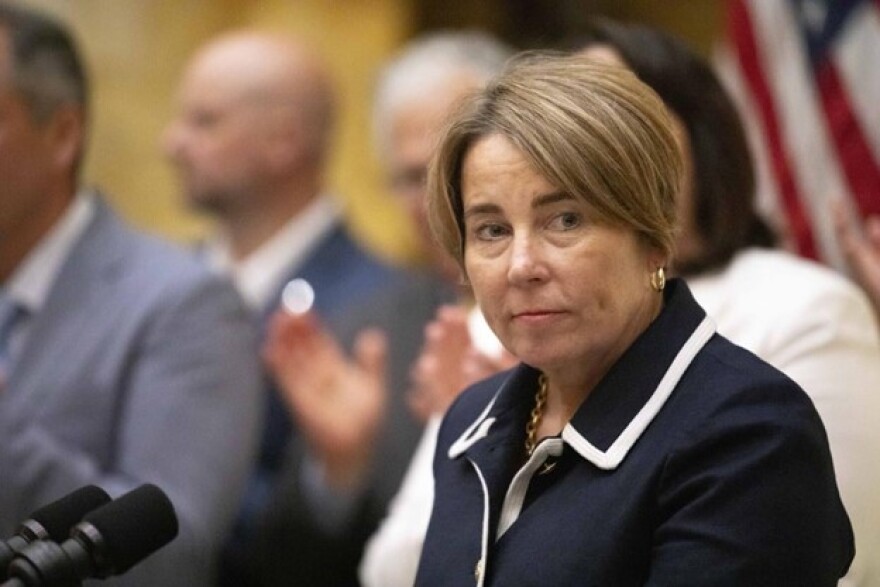Massachusetts Gov. Maura Healey has been outspoken about recent federal policy shifts and funding cuts under the Trump administration, and she attended the National Governors Association winter meeting to voice those concerns. Reporter Chris Lisinksi of the State House News Service explains why Healey didn't attend the National Governors Association meeting in Colorado that wrapped up on Saturday.
Chris Lisinksi, SHNS: The governor's office said she simply had prior commitments that she needed to prioritize last week. Of course, there's a possibility that there's a political angle to this and that the governor didn't want to interact with Health and Human Services Secretary Robert Kennedy Jr., whom she has called ‘a threat to public health.’
But, you know, it's worth noting that one of the events she had last week was down in Fall River with the follow up to the deadly Gabriel House assisted living facility fire. You could certainly understand why she might view that as more important at this time than gathering with other governors.
Carrie Healy, NEPM: So, what impact, if any, could Healey's absence from the National Governors Association meeting have on her future ability to influence or respond to decisions coming out of the Trump administration?
I would imagine it's fairly minor. She's already well known among her peers and among the political class. As a vocal critic of the Trump administration's policies. There's no secret there. Maybe some folks will call a different governor before calling Healey first. But I don't think there's going to be really anything like long term impacts as a result.
Changing lanes here… on to the topic of transportation. Gov. Healey had initially proposed a $1.5 billion, five-year plan to fund road and bridge repairs, but due to uncertainties in federal funding, lawmakers significantly scaled back this proposal, and they made it into a one-year appropriation with substantially less funding. Despite the reduction, one House lawmaker said that the revised bill promotes regional equity. So, what does regional equity mean in this context?
This is a significant change to the chapter 90 program, even though it's different than what the governor proposed. The governor sought $1.5 billion over five years. The Legislature opted to do $300 million over a single year.
So, effectively, it's the same per year amount, just with a one-year allocation instead of half a decade all at the start. In fact, $300 million is much more than the Legislature usually does in its once per year chapter 90 allotment.
And $100 million of that has a totally new formula based just on road mileage. So, if a city or town has more miles of road to maintain, you'll get more from that pot of money that's going to disproportionately assist rural communities in central and western Massachusetts who have a ton of road mileage to worry about, but smaller populations that might put them at a bit more of a disadvantage under the traditional chapter 90 formula.
And with the increased frequency of high rainfall storms in recent years, what are the various approaches that lawmakers took in this bill to account for climate change, infrastructure repair, and upgrades to prevent costly road washouts?
Yeah, there's about $885 million in other non-chapter 90 funding in this for different grant programs related to road and bridge repair. I believe $200 million of that is just for culverts and small bridges. So that just links directly to flooding concerns and climate change impacts.
Moving on, Chris, the governor's appointment of a top hospital lobbyist to the agency that regulates hospitals is raising eyebrows. On Friday, Healey named Steve Walsh, of the Massachusetts Health and Hospital Association, to the Health Policy Commission's board of directors. So, can you walk us through what critics are saying and how the administration is justifying that move?
Critics are concerned specifically because Steve Walsh has a job right now, today, as the head of the Health and Hospital Association, the trade group representing more than 70 hospitals across Massachusetts. They say that as a result, he's got a conflict of interest. And any matter involving any hospital that goes before the Health Policy Commission would violate that conflict of interest. The governor's office says in response that one state law requires someone with hospital experience to sit on the board. And who better to do that than the head of the hospital trade organization?
And they also note that Steve Walsh has committed to the governor's office to recuse himself from any matters that might be a conflict of interest, and to seek counsel from the State Ethics Commission and the Health Policy Commission's general counsel to make sure that any work he does remains within those bounds.
So, he's not committed to leaving his job?
No. As far as I understand it, he is going to stay in the Health and Hospital Association job with some firewalls in place that he and the governor hope prevent any conflict of interest or blurred lines.





